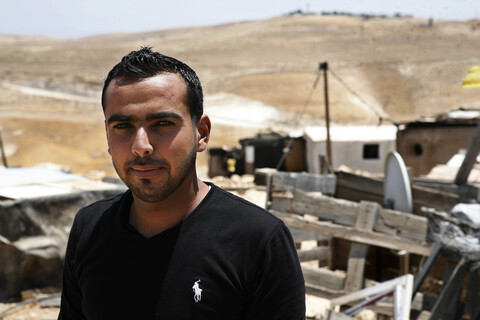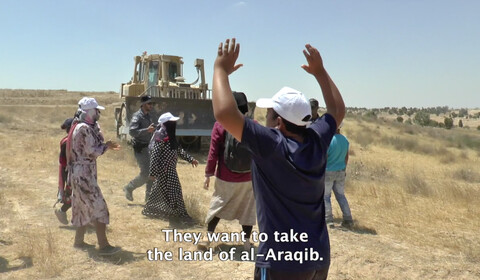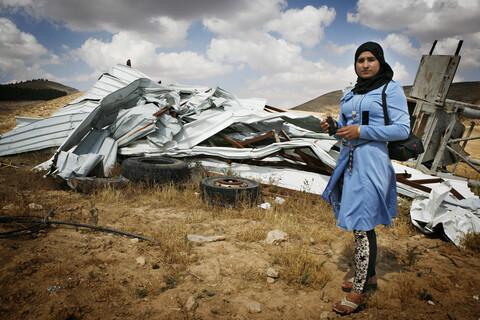The Electronic Intifada Dheisheh refugee camp 9 June 2015

One of the larger refugee camps in the occupied West Bank, Dheisheh is home to some 15,000 people squeezed into one square kilometer.
In the narrow alleys of Dheisheh refugee camp in the occupied West Bank city of Bethlehem, Muaath Atef points to a rooftop. “There, that’s a nice bit of plastic,” he laughs. Behind that bit of plastic lies a garden set up by Karama, a volunteer community organization in the camp.
Atef works with Karama, which runs after school activities and summer camps for local children. Three years ago, the group began setting up “micro-farms” on the rooftops of some 20 families in the camp.
“There was a need and we tried to address it,” Yasser Al-Haj, Karama’s director, explains, adding that projects are chosen and implemented according to the demands of the community and not according to the whims of foreign funders.
“We don’t go looking for funding and then make up a project that fits that call. If there are conditions attached to money, usually we say no,” he says.
The first nine rooftop greenhouses were made possible thanks to individual donations collected by a volunteer. Only later did Karama get a grant from Lush, the natural handmade cosmetics company, to build more greenhouses and include more families.
Cramped camp
Dheisheh is home to roughly 15,000 people living in less than one square kilometer. The average density in the United States is 35 people per square kilometer. The cramped conditions, Al-Haj explains, leave people quite literally without room to breathe.
“The gardens create more space but they also help maintain our connection to the land,” he adds. “The people here have land in villages they can’t reach. Their parents knew how to tend trees or grow vegetables but that knowledge has been lost. We wanted to reconnect people to the land.”
The camp was originally populated by refugees who fled or were expelled from 45 villages in and around the Hebron and Jerusalem areas by advancing Zionist militias during the 1948 ethnic cleansing of Palestine. During that time — known as the Nakba — more than 700,000 Palestinians were made refugees.
Awaiting a political solution that guarantees their right of return, those refugees and their descendants are still living in camps like Dheisheh.
Hajar Hamdan, a pensioner who looks after her ill mother, joined the rooftop garden project early on. Hamdan grows eggplants, tomatoes, cucumbers and a variety of herbs.
“I come up here to relax. Taking care of plants and seeing them grow gives me great satisfaction,” Hamdan says. “I produce a lot so I can share it with my neighbors.”
Hamdan is especially proud of the control she has on the production process and the high quality she is able to offer. “I don’t add any chemicals, so my vegetables are highly nutritious,” she says.
Relaxing
Hamdan’s neighbor Um Shadi is reaping the benefits of her rooftop garden, where she grows lettuce, herbs, peppers, cucumbers and tomatoes.
Seeing how much she enjoyed it, Um Shadi’s husband also began spending more time up on the roof.
“It relaxes us. Actually when the sun goes down and it’s a bit cooler under the plastic, all the family comes up,” Um Shadi explains. “My brothers come to check, the children measure how much the plants have grown and walk around as if they were in a forest. There’s something for everyone here.”
Um Shadi has six children and a large extended family. Although she plants in the summer and winter, she doesn’t yet produce quite enough for everyone and still needs to take trips to the shop to top up her crop.
“We learned a lot by trying things out and making mistakes,” she says. “My parents knew how to work the land in our village in Zakaria [a village depopulated in 1948] but I was born here. There’s no space here, no land and so I never learned.”
The process was tortuous. The second year that Um Shadi planted crops, they were lost to an invasion of small ants. “But we found a solution and started over,” Um Shadi adds.
“To follow nature’s pace and see the changes happening under your eyes is quite impressive,” says her husband, Abu Shadi.
“If this didn’t benefit us, I would have taken it down a long time ago and added some deck chairs instead,” Abu Shadi adds, laughing.
Silvia Boarini is a photojournalist based in Bir al-Saba and is currently working on a documentary on Naqab Bedouins.

Yaser Al-Haj, the director of the community organization Karama, inspects plants in the greenhouse built on the rooftop of the association’s offices in Dheisheh refugee camp in Bethlehem.

A mint plant in Karama’s greenhouse. After much experimentation, greenhouse owners have selected the crops that do best in the environment.

Greenhouse tomatoes ready to ripen.

Dheisheh resident Hajar Hamdan has always enjoyed keeping plants and spends much of the day tending to her crops on the roof.

Seeds are planted in compost placed inside pipe-like structures and watered with a drip irrigation system.

The greenhouse on Hajar Hamdan’s rooftop.

A cramped Dheisheh rooftop.

Abu Shadi takes a break inside the greenhouse.

The view from Abu Shadi’s rooftop.

Abu Shadi’s living room walls are adorned with a cross-stitched key symbolizing the right of return for Palestinian refugees.





